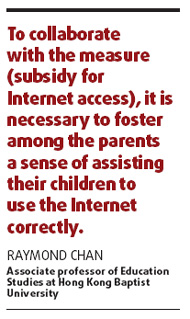Subsidy program for needy students tops education agenda
Updated: 2010-02-25 07:34
By Guo Jiaxue(HK Edition)
|
|||||||||

HONG KONG: Yesterday's budget places considerable focus on education, especially the education of students from needy families. The government proposes to spend HK$52.2 billion on education for the year 2010-2011. Included is a subsidy program providing individual grants of HK$1,300 to facilitate the Internet learning of primary and secondary students from low-income families.
The HK$52.2 billion proposed by Financial Secretary John Tsang occupies about 20 percent, the largest share, of all recurrent government expenditures. The government has been investing heavily in education in recent years. Recurrent expenditure in this area has increased by 10 percent annually over the past 10 years. Apart from continuing education reform such as the new academic structure for senior secondary and for higher education, and focusing on smaller class sizes in primary schools, the government will adopt a two-pronged approach to help needy students with Internet learning.
Tsang suggested a subsidy of HK$1,300 for Internet access charges in the 2010 school year to each family on the Comprehensive Social Security Assistance (CSSA) scheme. For each family with children studying in primary or secondary schools and eligible for student financial assistance, Tsang proposed a full subsidy of HK$1,300 or half subsidy of HK$650, depending on the outcome of their means test.
To offer more affordable options, Tsang will encourage the market to provide these students with economical Internet services and computer hardware. The government is making preparations for a non-profit-making organization to collaborate with private service providers and community organizations, so as to make the policy more cost-effective. The non-profit-making organization will also provide complementary services such as parent education and technical support.
Raymond Chan, associate professor of Education Studies at Hong Kong Baptist University, agrees with the new measure. "In today's education in Hong Kong, the Internet has been an essential teaching arrangement," he said. But at the same time he raised a concern about Internet abuse or misuse among young students. "To collaborate with the measure, it is necessary to foster among the parents a sense of assisting their children to use the Internet correctly," he added.
In addition to facilitating Internet learning, Tsang proposes to increase recurrent funding for the School-based After-school Learning and Support Programs by HK$100 million to HK$175 million. The initiative is intended to broaden the learning experience outside the classroom for students from needy families. The plan includes homework tutorials, cultural and art programs, sports, leadership training, and volunteer services. The measure is aimed at increasing students' self-confidence and sense of belonging, nurture them into capable individuals, and reduce cross-generational poverty.
As for higher education, Tsang proposed to allocate HK$1 billion to launch the fifth Matching Grant Scheme. The scheme established to help institutions tap more funding sources will continue for the year of 2010-2011. The scheme, for the first time, will cover all 12 degree-awarding institutions.
A site will also be reserved to establish a self-financing tertiary institution. The site at the former Queen Hill's Camp in the New Territories will provide a gross floor area of more than 100,000 sq m. The institution is expected to provide some 8,000 self-financing degree places.
Legislator Regina Ip expressed reservations about the proposal. She doubted the self-financing tertiary institution would be a success because of the time it takes to develop a good institution. Land allocation alone is not enough, she said. She also advised the government to put more resources into the existing universities and institutions.
To assist Hong Kong people in the economic integration with the mainland, Tsang will inject HK$500 million into the Language Fund to further upgrade Hong Kong people's biliterate and trilingual proficiency. Relevant initiatives include introducing or optimizing the school-based measures under the English Enhancement Scheme, and creating an environment conducive to learning English and Putonghua. The government will also assist non-Chinese speaking students in Hong Kong to learn Chinese and adapt to the local curriculum as soon as possible.
Legislator Miriam Lau believes the government has focused its efforts in the right direction. She expectes the government to further elaborate what actions will be taken to help people's language proficiency. But Ip is worried that the funding allocation will benefit the private language learning sectors.
(HK Edition 02/25/2010 page1)